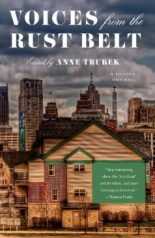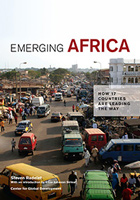Readers’ Group
The Future Cities Readers’ Group is a book club with a difference providing an alternative to the conventional focus on fiction books. We meet monthly to discuss all kinds of contemporary texts from architecture to anthropology and population to philosophy.
Readers’ Groups are invite only.. but you can certainly ask to be invited! For further information, or if you wish to be added to the Readers’ Group online conference and mailing list, email us at futurecitiesproject_ATgmail.com
NEXT READERS GROUP DISCUSSION
26 March 2025. 7pm.
 A war is being waged against the Past. Whether it’s toppling statues, decolonising the curriculum or erasing terms from our vocabulary, a cultural crusade is underway designed to render the past toxic. What is at stake in provoking such a strong sense of societal shame towards Western history?
A war is being waged against the Past. Whether it’s toppling statues, decolonising the curriculum or erasing terms from our vocabulary, a cultural crusade is underway designed to render the past toxic. What is at stake in provoking such a strong sense of societal shame towards Western history?
Furedi mounts a fierce defence of the past and calls for a fight back against the delegitimization of its ideals and accomplishments. Casting the past as a story of shame has become a taken-for granted outlook permeating the educational and cultural life of western society from the top down. Its advocates may see it as a cultural imperative, but a society that loses touch with its past will face a permanent crisis of identity. Challenging this great betrayal, Furedi argues, is one of the most important battles of our time.
Buy this from Amazon UK
PREVIOUS DISCUSSIONS
13 November 2024. 7pm.
 Since the beginning of the 21st century, global warming, terrorism, the pandemic and now the war in Ukraine have created a widespread feeling that the world is an increasingly dangerous place. In response to this situation, it is understandable that many people are inclined to retreat to the safety of their home – the last refuge and safeguard against the savagery of the outside world. But the home is not just a shelter: it is a space that supplants and replaces the world, a wired cocoon that gradually renders any journey to the outside world superfluous.
Since the beginning of the 21st century, global warming, terrorism, the pandemic and now the war in Ukraine have created a widespread feeling that the world is an increasingly dangerous place. In response to this situation, it is understandable that many people are inclined to retreat to the safety of their home – the last refuge and safeguard against the savagery of the outside world. But the home is not just a shelter: it is a space that supplants and replaces the world, a wired cocoon that gradually renders any journey to the outside world superfluous.
From our couch, we can enjoy remotely the pleasures once offered by the cinema, the theatre and the café. Everything, from food to love to art, can be delivered to your door. In this witty and spirited book, Pascal Bruckner suggests that it is no longer the tyranny of lockdowns that threatens us, but rather the tyranny of the sofa.
Buy this from Amazon UK
8 May 2024. 7pm.
India’s Moment: Changing Power Equations around the World by Mohan Kumar
 The idea of how India negotiates with the world is at the heart of this book. Career diplomat Mohan Kumar represented India at multiple international fora over a career spanning three and a half decades. During this time, it was hard to escape the view, held even by India’s friends, that the country was somehow more of a naysayer than a partner in key international parleys.
The idea of how India negotiates with the world is at the heart of this book. Career diplomat Mohan Kumar represented India at multiple international fora over a career spanning three and a half decades. During this time, it was hard to escape the view, held even by India’s friends, that the country was somehow more of a naysayer than a partner in key international parleys.
This book, then, is a sincere attempt to set the record straight. A central contention of this book is that India has moved, slowly but surely, from being an alleged naysayer to becoming a putative partner for the world in key multilateral negotiations. More broadly, this reflects India’s growing political, economic and strategic clout in the world today. It is only when this transformation is fuller and more substantial that India will be able to fulfil its manifest destiny of becoming a leading power, capable of shaping global rules.
Buy this from Amazon UK
17 January 2024. 7pm.
Israelophobia: The Newest Version of the Oldest Hatred and What To Do About It by Jake Wallis Simons
 In the Middle Ages, Jews were hated for their religion. In the twentieth century, they were hated because of their race. Today, Jews are hated for something else entirely, their nation-state of Israel. Antisemitism has morphed into something both ancient and modern: Israelophobia. But how did this transformation occur? And why?
In the Middle Ages, Jews were hated for their religion. In the twentieth century, they were hated because of their race. Today, Jews are hated for something else entirely, their nation-state of Israel. Antisemitism has morphed into something both ancient and modern: Israelophobia. But how did this transformation occur? And why?
Urgent, incisive and deeply necessary, Israelophobia reveals why the Middle East’s only democracy, which uniquely respects the rights of women and sexual and religious minorities, attracts such disproportionate levels of slander. Rather than defending Israel against all criticism, it argues for reasonable disagreement based on reality instead of bigotry.
Buy this from Amazon UK
8 November 2023. 7pm.
Taking Control: Sovereignty and Democracy after Brexit by Philip Cunliffe, George Hoare, Lee Jones and Peter Ramsay
 Taking Control argues that neither side in the Brexit debate really understood the European Union or what was involved in reclaiming Britain’s sovereignty. The EU is neither a supranational nanny state, nor an internationalist peace project. It is the means by which Europe’s elites transformed their own states in order to rule the void where representative politics used to be. Leaving the EU is a necessary but not sufficient step towards closing the chasm between rulers and ruled.
Taking Control argues that neither side in the Brexit debate really understood the European Union or what was involved in reclaiming Britain’s sovereignty. The EU is neither a supranational nanny state, nor an internationalist peace project. It is the means by which Europe’s elites transformed their own states in order to rule the void where representative politics used to be. Leaving the EU is a necessary but not sufficient step towards closing the chasm between rulers and ruled.
This book makes the democratic case for national sovereignty, arguing for a radical, forward-looking reconstitution of the British nation-state through strengthening representative democracy. It is essential for anyone who wonders why British politics is so dysfunctional and who wants to do better.
Buy this from Amazon UK
19 July 2023. 7pm.
Values, Voice and Virtue: The New British Politics by Matthew Goodwin
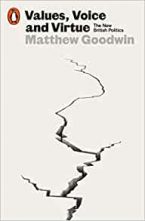 What has caused the recent seismic changes in British politics, including Brexit and a series of populist revolts against the elite? Why did so many people want to overturn the status quo? Where have the Left gone wrong? And what deeper trends are driving these changes?
What has caused the recent seismic changes in British politics, including Brexit and a series of populist revolts against the elite? Why did so many people want to overturn the status quo? Where have the Left gone wrong? And what deeper trends are driving these changes?
British politics is coming apart. A country once known for its stability has recently experienced a series of shocking upheavals. Matthew Goodwin, acclaimed political scientist and co-author of National Populism, shows that the reason is not economic hardship, personalities or dark money. It is a far wider political realignment that will be with us for years to come. An increasingly liberalised, globalised ruling class has lost touch with millions, who found their values ignored, their voices unheard and their virtue denied. Now, this new alliance of voters is set to determine Britain’s fate.
Buy this from Amazon UK
31 May 2023. 7pm.
A Revolution Betrayed: How Egalitarians Wrecked the British Education System by Peter Hitchins
 In his new book, Peter Hitchens describes the misjudgements made by politicians over the years that have led to the increase of class distinction and privilege in our education system.
In his new book, Peter Hitchens describes the misjudgements made by politicians over the years that have led to the increase of class distinction and privilege in our education system.
In trying to bring about an educational system which is egalitarian, the politicians have created a system which is the exact opposite. And what’s more, it is a system riddled with anomalies – Sixth Form Colleges select pupils on ability at the age of 15, which rules out any child who does not have major educational backing from home (heavy involvement by working parents or private tutors, for example) and academies also are selective, though they pretend not to be.
This is an in-depth look at the British education system and what will happen if things don’t change radically.
Buy this from Amazon UK
29 March 2023
Beyond Confrontation: Globalists, Nationalists and Their Discontents by Phil Mullan
 “Reactions to the Coronavirus pandemic have escalated the pre-existing tensions between the US and China and among different Western nations. Confrontations between political globalists and mercantilist nationalists – between supporters of the rules-based international order and proponents of overt protectionism – are fueling ever-stronger international resentments.
“Reactions to the Coronavirus pandemic have escalated the pre-existing tensions between the US and China and among different Western nations. Confrontations between political globalists and mercantilist nationalists – between supporters of the rules-based international order and proponents of overt protectionism – are fueling ever-stronger international resentments.
Coupling argumentative rigor with a pragmatic, plainspoken approach, Phil Mullan charts out a novel, democratic way past dangerous and self-defeating confrontations towards a future of open international collaboration based on popular participation within nation states. With its clear-eyed assessment of the opportunities and challenges of a more interconnected world – an assessment in which the economic internationalisation underpinning globalisation theories is neither romanticised nor vilified – Beyond Confrontation sets a judicious tone for the big geopolitical themes of our times.”
Buy this from Amazon UK
7 December 2022. 7pm.
The Road to Ukraine: How the West Lost its Way by Frank Furedi
 Furedi argues that the West’s self-inflicted condition of historical amnesia has encouraged it to disregard the salience of geo-political realities. Suddenly the once fashionable claims that made up the virtues of globalisation appear threadbare. This problem, which was already evident during the global Covid pandemic has reached a crisis point in the battlefield of Ukraine. History has had its revenge on a culture that believes that what happened in the past no longer matters. “The Road To Ukraine: How the West Lost Its Way” argues that overcoming the state of historical amnesia is the precondition for the restoration of global solidarity.
Furedi argues that the West’s self-inflicted condition of historical amnesia has encouraged it to disregard the salience of geo-political realities. Suddenly the once fashionable claims that made up the virtues of globalisation appear threadbare. This problem, which was already evident during the global Covid pandemic has reached a crisis point in the battlefield of Ukraine. History has had its revenge on a culture that believes that what happened in the past no longer matters. “The Road To Ukraine: How the West Lost Its Way” argues that overcoming the state of historical amnesia is the precondition for the restoration of global solidarity.
Buy this from Amazon UK
19 October 2022. 7pm.
How Woke Won: The elitist movement that threatens democracy, tolerance and reason by Joanna Williams
 Jonathan Haidt, co-author of The Coddling of the American Mind writes:
Jonathan Haidt, co-author of The Coddling of the American Mind writes:
“This book is the essential guide for our era of confusion and incoherence as moral revolutionaries tear down statues, institutions, and widely held values. With clear thinking and gripping storytelling, Williams explains how how a minority of the elites in Britain and America were able to intimidate the rest of the elites into silence or complicity, imposing a ‘revolution from above’ that is anti-democratic and cruel. Anyone who wants to restore sanity, beauty, or simple humanity to our public life should read How Woke Won.”
Buy this from Amazon UK
21 July 2022. 7pm.
The War on the West: How to prevail in the age of unreason by Douglas Murray
 It’s become, Douglas explains, perfectly acceptable to celebrate the contributions of non-Western cultures, but discussing their flaws and crimes is called hate speech. What’s more it has become acceptable to discuss the flaws and crimes of Western culture, but celebrating their contributions is also called hate speech.
It’s become, Douglas explains, perfectly acceptable to celebrate the contributions of non-Western cultures, but discussing their flaws and crimes is called hate speech. What’s more it has become acceptable to discuss the flaws and crimes of Western culture, but celebrating their contributions is also called hate speech.
Some of this is a much-needed reckoning; however, some of it is part of a larger international attack on reason, democracy, science, progress, and the citizens of the West by dishonest scholars, etc..
Murray’s latest book carefully and methodically shows how far political discourse has strayed in Europe and America from its stated goals: justice and equality. Propelled by an incisive deconstruction of inconsistent arguments and activism, towards a clarion call for the defence of enlightenment values.
Buy this from Amazon UK
11 May 2022. 7pm.
Liberalism: and its discontent by Frances Fukuyama
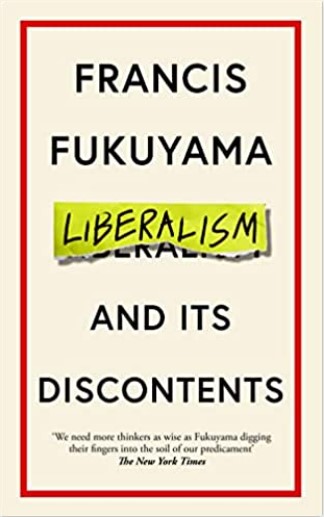 The Literary Review says: “With his 1992 book The End of History and the Last Man, Francis Fukuyama became the intellectual poster boy of late 20th-century liberal triumphalism. His central argument was that liberal democracy was becoming a global standard, the inevitable destination of political progress.
The Literary Review says: “With his 1992 book The End of History and the Last Man, Francis Fukuyama became the intellectual poster boy of late 20th-century liberal triumphalism. His central argument was that liberal democracy was becoming a global standard, the inevitable destination of political progress.
Things haven’t quite worked out that way, making Fukuyama one of the most interesting public intellectuals around. Indeed, the recent decade has seen liberalism and democracy in full-scale retreat.
But his new book, Liberalism and Its Discontents, is his first full-throated defence of the liberal project since 1992.”.
Buy this from Amazon UK
NB: These events are LIVE face-to-face meetings
24 November 2021. 7pm.
100 Years of Identity Crisis: Culture War over Socialisation by Frank Furedi
The concept of Identity Crisis came into usage in the 1940s and it has continued to dominate the cultural zeitgeist ever since. In his exploration of the historical origins of this development, Frank Furedi argues that the principal driver of the ‘crisis of identity’ was and continues to be the conflict surrounding the socialisation of young people. In turn, the politicisation of this conflict provides a terrain on which the Culture Wars and the politicisation of identity can flourish.
Through exploring the interaction between the problems of socialisation and identity, this study offers a unique account of the origins and rise of the Culture Wars
Buy this from Amazon UK
22 September 2021. 7pm.
Liars: Falsehoods and Free Speech in an Age of Deception by Cass Sunstein
In the UK proposals through the Online Safety Bill to tackle ‘legal but harmful speech’ online, including misinformation, have been labelled a ‘threat to free speech’ in the House of Lords.
Meanwhile, the Biden Administration has raised eyebrows with its admission that it is working with social media companies and even SMS carriers to eliminate misinformation over the Covid vaccines. Apparently just a dozen individuals are responsible for most anti-vaccine messages online.
But is there ever a right to lie? Sunstein argues that although we cannot eliminate lies from public discourse, exceptions need to be made in the case of harm to individuals, including through cancellation, or to democracy itself.
Buy this from Amazon UK
16 June 2021. 7pm.
How to Avoid a Climate Disaster: The Solutions We Have and the Breakthroughs We Need by Bill Gates
Bill Gates argues that we need to achieve zero carbon but rather than austerity he champions innovative solutions including nuclear power and synthetic beef. Gates admits to thinking more like an engineer than a political scientist, but is this approach a refreshing counterpoint to the moralism that pervades the environmental debate, or too technocratic and dependent on “energy miracles” to solve our problems for us?
Gates lays out a concrete, practical plan for achieving the goal of zero emissions-suggesting not only policies that governments should adopt, but what we as individuals can do to keep our government, our employers, and ourselves accountable in this crucial enterprise. As he makes clear, achieving zero emissions will not be simple or easy to do, but he argues that it can be acheived.
Buy this from Amazon UK
22 April 2021. 7pm.
Free Speech: And Why it Matters by Andrew Doyle
Free speech is the bedrock of all our liberties, and yet in recent years it has come to be mistrusted. A new form of social justice activism, which perceives language as potentially violent, has prompted a national debate on where the limitations of acceptable speech should be drawn. Governments throughout Europe have enacted ‘hate speech’ legislation to curb the dissemination of objectionable ideas, Silicon Valley tech giants are collaborating to ensure that they control the limitations of public discourse, and campaigners in the US are calling for revisions to the First Amendment.
However well-intentioned, these trends represent a threat to the freedoms that our ancestors fought and died to secure.
Buy this from Amazon UK
24 March 2021. 7pm.
Jews Don’t Count by David Baddiel
Jews Don’t Count is a book for people who consider themselves on the right side of history. People fighting the good fight against homophobia, disablism, transphobia and, particularly, racism. People, possibly, like you.
It is the comedian and writer David Baddiel’s contention that one type of racism has been left out of this fight. In his unique combination of close reasoning, polemic, personal experience and jokes, Baddiel argues that those who think of themselves as on the right side of history have often ignored the history of anti-Semitism. Why, in a time of intensely heightened awareness of minorities, Jews don’t count as a real minority: and why they should?
Buy this from Amazon UK
10 February 2021. 7pm.
The Twilight of Democracy by Anne Applebaum
To start the New Year, following Brexit finally taking place and the extraordinary events following the US election, an attack on the seat of democracy and talk of a ‘reckoning with Trump supporters’ we will be discussing Anne Applebaum’s ‘Twilight of Democracy: The Failure of Politics and the Parting of Friends’, a personal and journalistic take on how we got here.
“In the years just before and after the fall of the Berlin Wall, people from across the political spectrum in Europe and America celebrated a great achievement, felt a common purpose and, very often, forged personal friendships. Yet over the following decades the euphoria evaporated, the common purpose and centre ground gradually disappeared, extremism rose once more and eventually – as this book compellingly relates – the relationships soured too.
Anne Applebaum traces this history in an unfamiliar way, looking at the trajectories of individuals caught up in the public events of the last three decades. When politics becomes polarized, which side do you back?
Buy this from Amazon UK
16 December 2020. 7pm.
The Nickel Boys by Colson Whitehead
An end of year Readers’ Group novel!
This year’s Pulitzer Prize-winning novel by Colson Whitehead brilliantly dramatizes another strand of American history through the story of two boys unjustly sentenced to a hellish reform school in Jim Crow-era Florida. It is based on a real story of an American reform school.
When Elwood Curtis, a black boy growing up in 1960s Tallahassee, is unfairly sentenced to a juvenile reformatory called the Nickel Academy, he finds himself trapped in a grotesque chamber of horrors. Elwood’s only salvation is his friendship with fellow “delinquent” Turner, which deepens despite Turner’s conviction that Elwood is hopelessly naive, that the world is crooked, and that the only way to survive is to scheme and avoid trouble. As life at the Academy becomes ever more perilous, the tension between Elwood’s ideals and Turner’s skepticism leads to a decision whose repercussions will echo down the decades.
Buy this from Amazon UK
12 November 2020. 7pm.
The Coming of Neo-Feudalism: A Warning to the Global Middle Class by Joel Kotkin
Read the review here by Stephen Nash
Following a remarkable epoch of greater dispersion of wealth and opportunity, we are inexorably returning towards a more feudal era marked by greater concentration of wealth and property, reduced upward mobility, demographic stagnation, and increased dogmatism. If the last seventy years saw a massive expansion of the middle class, not only in America but in much of the developed world, today that class is declining and a new, more hierarchical society is emerging.
The new class structure resembles that of Medieval times. At the apex of the new order are two classes―a reborn clerical elite, the clerisy, which dominates the upper part of the professional ranks, universities, media and culture, and a new aristocracy led by tech oligarchs with unprecedented wealth and growing control of information. These two classes correspond to the old French First and Second Estates.
Buy this from Amazon UK
2 September 2020. 7pm.
The Virus in the Age of Madness by Bernard-Henri Levy
An incisive look at how COVID-19 reveals the dangerous fault lines of contemporary society. With medical mysteries, rising death tolls, and conspiracy theories beamed minute by minute through the vast web universe, the coronavirus pandemic has irrevocably altered societies around the world. In this sharp essay, world-renowned philosopher Bernard-Henri Levy interrogates the many meanings and metaphors we have assigned to the pandemic-and what they tell us about ourselves.
Drawing on the philosophical tradition from Plato and Aristotle to Lacan and Foucault, Levy asks uncomfortable questions about reality and mythology: he rejects the idea that the virus is a warning from nature, the inevitable result of global capitalism; he questions the heroic status of doctors, asking us to think critically about the loci of authority and power; he challenges the panicked polarization that dominates online discourse.ss
Buy this from Amazon UK
23 July 2020. 7pm.
Why I’m No Longer Talking to White People About Race by Reni Eddo-Lodge
Walk into any bookshop, read any university website, peruse coffee-table selections and you’ll find a reference to Eddo-Lodge’s 2017 book. It’s hard to remember a book that has received so much establishment endorsement to the point of an official recommendation that you buy this book.
As the Black Lives Matters protests strengthen in the aftermath of the murder of George Floyd in America, this book is No.1 in the Sunday Times Bestseller list; Winner of the British Book Awards Non-Fiction Narrative; Book of the Year 2018; Foyles Non-Fiction Book of the Year; Blackwell’s Non-Fiction Book of the Year; Winner of the Jhalak Prize; Longlisted for the Baillie Gifford Prize for Non-Fiction; Longlisted for the Orwell Prize.
Is it really that brilliant?
Buy this from Amazon UK
24 June 2020. 7pm.
Voices from the Rust Belt by Anne Trubek
America’s Rust Belt includes Michigan, Ohio, and Pennsylvania, as well as parts of Illinois, Wisconsin, and New York. The region reflects the country’s manufacturing center, which, over the past forty years, has been in decline. In the 2016 election, the Rust Belt’s economic woes became a political talking point, and helped pave the way for a Donald Trump victory.
Voices from the Rust Belt pulls together a distinct variety of voices from people who call the region home. Voices that emerge from familiar Rust Belt cities–Detroit, Cleveland, Flint, and Buffalo, among other places–and observe, with grace and sensitivity, the changing economic and cultural realities for generations of Americans.
Buy this from Amazon UK.
Read our review here.
18 May 2020.
Down and Out in Paris and London by George Orwell
Down and Out in Paris and London was the outcome of Orwell’s struggling years in Paris and of months tramping south-east England. Whilst not quite autobiography, it does give a vivid picture of the kind of life he led ‘in the lower depths’, and exemplifies his belief that ‘The greatest of evils and the worst of crimes is poverty. ‘ Orwell thought of calling this first book ‘Confessions of a Dishwasher’. (Penguin)
Email us for more info, or if you wish to be added to our mailing list and join our Zoom.
Buy this from Amazon UK or a FREE version is available here
22 April 2020.
Voyage Around my Room by Xavier de Maistre
 Described as a lively and utterly singular travelogue of the intricate curiosities that are directly within one’s own reach.
Described as a lively and utterly singular travelogue of the intricate curiosities that are directly within one’s own reach.
In 1790, while serving in the Piedmontese army, the French aristocrat Xavier de Maistre (1763–1852) was punished for dueling and placed under house arrest for forty-two days. The result was a discursive, mischievous memoir Voyage Around My Room, and its sequel, Nocturnal Expedition Around My Room. Admired by Nietzsche and Machado de Assis, Ossian and Susan Sontag, this classic book proves that sitting on the living-room sofa can be as fascinating as crossing the Alps or paddling up the Amazon.
During the lockdown, we have gone online into video conference mode. We are always happy to accept new readers, new critics and new reviewers. Email us for more info, or if you wish to be added to our mailing list.
Buy this from Amazon UK or a FREE version is available here
25 March 2020
The Madness of Crowds: Gender, Race and Identity by Douglas Murray
 A progressive argument for repealing the Human Rights Act. Contrary to contemporary panic around human rights repeal, Human Rights – Illusory Freedom puts a progressive case against the Human Rights Act. It describes how human rights arose as a new language for western governments following the collapse in their collective authority in the aftermath of World War 2 and shows how the UK Human Rights Act has presided over a catastrophic loss of freedom, which continued a process which began with the Tory party in the 1970s. Human Rights – Illusory Freedom makes a positive case for restoring control over our traditional freedoms to the electorate and away from unaccountable Judges in the UK Courts and the European Court of Human Rights.
A progressive argument for repealing the Human Rights Act. Contrary to contemporary panic around human rights repeal, Human Rights – Illusory Freedom puts a progressive case against the Human Rights Act. It describes how human rights arose as a new language for western governments following the collapse in their collective authority in the aftermath of World War 2 and shows how the UK Human Rights Act has presided over a catastrophic loss of freedom, which continued a process which began with the Tory party in the 1970s. Human Rights – Illusory Freedom makes a positive case for restoring control over our traditional freedoms to the electorate and away from unaccountable Judges in the UK Courts and the European Court of Human Rights.
Email us for more info, or if you wish to be added to our mailing list.
Buy this from Amazon UK
19 February 2020
Human Rights – Illusory Freedom: Why we should repeal the Human Rights Act by Luke Gittos
 A progressive argument for repealing the Human Rights Act. Contrary to contemporary panic around human rights repeal, Human Rights – Illusory Freedom puts a progressive case against the Human Rights Act. It describes how human rights arose as a new language for western governments following the collapse in their collective authority in the aftermath of World War 2 and shows how the UK Human Rights Act has presided over a catastrophic loss of freedom, which continued a process which began with the Tory party in the 1970s. Human Rights – Illusory Freedom makes a positive case for restoring control over our traditional freedoms to the electorate and away from unaccountable Judges in the UK Courts and the European Court of Human Rights.
A progressive argument for repealing the Human Rights Act. Contrary to contemporary panic around human rights repeal, Human Rights – Illusory Freedom puts a progressive case against the Human Rights Act. It describes how human rights arose as a new language for western governments following the collapse in their collective authority in the aftermath of World War 2 and shows how the UK Human Rights Act has presided over a catastrophic loss of freedom, which continued a process which began with the Tory party in the 1970s. Human Rights – Illusory Freedom makes a positive case for restoring control over our traditional freedoms to the electorate and away from unaccountable Judges in the UK Courts and the European Court of Human Rights.
Email us for more info, or if you wish to be added to our mailing list.
Buy this from Amazon UK
23 October 2019
Culture War: Art, Identity Politics and Cultural Entryism by Alexander Adams
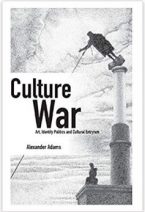 Why has identity become so central to judging art today? Why are some groups reluctant to defend free speech within culture? Has state support made artists poorer not richer? How does the movement for social justice influence cultural production? Why is post-modernism dominant in the art world? Why are consumers of comic books so bitterly divided?
Why has identity become so central to judging art today? Why are some groups reluctant to defend free speech within culture? Has state support made artists poorer not richer? How does the movement for social justice influence cultural production? Why is post-modernism dominant in the art world? Why are consumers of comic books so bitterly divided?
In “Culture War: Art, Identity Politics and Cultural Entryism”, Alexander Adams examines a series of pressing issues in today’s culture: censorship, Islamism, Feminism, identity politics, historical reparations and public arts policy. Through a series of linked essays, Adams exposes some uncomfortable truths.
Email us for more info, or if you wish to be added to our mailing list.
Buy this from Amazon UK
18 September 2019
Pen in Hand: Reading, Rereading and other Mysteries by Tim Parks
 Tim Parks writes: “Imagine you are asked what single alteration in people’s behavior might best improve the lot of mankind. How foolish would you have to be to reply: have them learn to read with a pen in their hands? But I firmly believe such a simple development would bring huge benefits.”
Tim Parks writes: “Imagine you are asked what single alteration in people’s behavior might best improve the lot of mankind. How foolish would you have to be to reply: have them learn to read with a pen in their hands? But I firmly believe such a simple development would bring huge benefits.”
How can other people like the books we don’t like? What benefit can we get from rereading a work? Can we read better? If so, how?
1 May 2019
Factfulness: Ten Reasons We’re Wrong About The World – And Why Things Are Better Than You Think by Hans Rosling
 “This book is my last battle in my life-long mission to fight devastating ignorance…Previously I armed myself with huge data sets, eye-opening software, an energetic learning style and a Swedish bayonet for sword-swallowing. It wasn’t enough. But I hope this book will be.”
“This book is my last battle in my life-long mission to fight devastating ignorance…Previously I armed myself with huge data sets, eye-opening software, an energetic learning style and a Swedish bayonet for sword-swallowing. It wasn’t enough. But I hope this book will be.”
— Hans Rosling, February 2017.
In Factfulness, Professor of International Health and global TED phenomenon Hans Rosling, together with his two long-time collaborators, Anna and Ola reveal the ten instincts that distort our perspective—from our tendency to divide the world into two camps (usually some version of us and them) to the way we consume media (where fear rules) to how we perceive progress (believing that most things are getting worse).
20 February 2019
The Left Case Against the EU by Costas Lapavitsas
 Many on the Left see the European Union as a fundamentally benign project with the potential to underpin ever greater cooperation and progress. If it has drifted rightward, the answer is to fight for reform from within. In this iconoclastic polemic, economist Costas Lapavitsas demolishes this view. He contends that the EU’s response to the Eurozone crisis represents the ultimate transformation of the union into a neoliberal citadel that institutionally embeds austerity, privatization, and wage cuts. These related developments make the EU impervious to meaningful reform. The solution is therefore a direct challenge to the EU project that stresses popular and national sovereignty as preconditions for true internationalist socialism.
Many on the Left see the European Union as a fundamentally benign project with the potential to underpin ever greater cooperation and progress. If it has drifted rightward, the answer is to fight for reform from within. In this iconoclastic polemic, economist Costas Lapavitsas demolishes this view. He contends that the EU’s response to the Eurozone crisis represents the ultimate transformation of the union into a neoliberal citadel that institutionally embeds austerity, privatization, and wage cuts. These related developments make the EU impervious to meaningful reform. The solution is therefore a direct challenge to the EU project that stresses popular and national sovereignty as preconditions for true internationalist socialism.
Buy this from Amazon UK
7 November 2018
How Fear Works: Culture of Fear in the Twenty-First Century by Frank Furedi
 Society is continually bombarded with the message that the threats it faces are incalculable and cannot be managed or contained. The ascendancy of this outlook has been paralleled by the cultivation of helplessness and passivity – all this has heightened people’s sense of powerlessness and anxiety. As a consequence we are constantly searching for new forms of security, both physical and ontological. Furedi believes that through understanding how fear works, we can encourage attitudes that will help bring about a less fearful future..
Society is continually bombarded with the message that the threats it faces are incalculable and cannot be managed or contained. The ascendancy of this outlook has been paralleled by the cultivation of helplessness and passivity – all this has heightened people’s sense of powerlessness and anxiety. As a consequence we are constantly searching for new forms of security, both physical and ontological. Furedi believes that through understanding how fear works, we can encourage attitudes that will help bring about a less fearful future..
Buy this from Amazon UK
5 September 2018
How Democracy Ends by David Runciman
 We think we know what the end of democracy looks like: chaos descends and the military arrives to restore order, until the people can be trusted to look after their own affairs again. However, there is a danger that this picture is out of date. Is the end of democracy happening now as Trump, Brexit and paranoid populism have become a reality? David Runciman, one of the UK’s leading professors of politics, surveys the political landscape of the West, helping us to spot the new signs of a collapsing democracy and advising us on what could come next.
We think we know what the end of democracy looks like: chaos descends and the military arrives to restore order, until the people can be trusted to look after their own affairs again. However, there is a danger that this picture is out of date. Is the end of democracy happening now as Trump, Brexit and paranoid populism have become a reality? David Runciman, one of the UK’s leading professors of politics, surveys the political landscape of the West, helping us to spot the new signs of a collapsing democracy and advising us on what could come next.
Buy this from Amazon UK
23rd May 2018
To Be a Machine by Mark O’Connell
 From charismatic techies seeking to enhance the body to immortalists who believe in the possibility of ‘solving’ death, from computer programmers quietly re-designing the world to vast competitive robotics conventions, To Be a Machine paints a vivid portrait of our broader faith in the power of technology as an engine of human progress. It is a character study of human eccentricity, and a meditation on the immemorial desire to transcend the basic facts of our animal existence that tackles an urgent question: what next for mankind?
From charismatic techies seeking to enhance the body to immortalists who believe in the possibility of ‘solving’ death, from computer programmers quietly re-designing the world to vast competitive robotics conventions, To Be a Machine paints a vivid portrait of our broader faith in the power of technology as an engine of human progress. It is a character study of human eccentricity, and a meditation on the immemorial desire to transcend the basic facts of our animal existence that tackles an urgent question: what next for mankind?
Buy this from Amazon UK
Email us for more info, or if you wish to be added to our mailing list.
4th April 2018
White Working Class: Overcoming class cluelessness in America by Joan Williams
 Williams explains why so much of the elite’s analysis of the white working class is misguided, rooted in assumptions by what she has controversially coined “class cluelessness.” For Williams they have conflated “working class” with “poor.” Williams explains how the term “working class” has been misapplied–it is, in fact, the elusive, purportedly disappearing middle class. Their dream is not to join the upper middle class, with its different culture, but to stay true to their own values in their own communities–just with more money.
Williams explains why so much of the elite’s analysis of the white working class is misguided, rooted in assumptions by what she has controversially coined “class cluelessness.” For Williams they have conflated “working class” with “poor.” Williams explains how the term “working class” has been misapplied–it is, in fact, the elusive, purportedly disappearing middle class. Their dream is not to join the upper middle class, with its different culture, but to stay true to their own values in their own communities–just with more money.
White Working Class is a blunt, bracing narrative that sketches a nuanced portrait of millions of people throughout the world who have proven to be a potent political force.
For anyone stunned by the rise in populist, nationalist movements, wondering why so many would seemingly vote against their own economic interests or simply feeling like a stranger in their own country, White Working Class will be a convincing primer on how to connect with a crucial set of workers–and voters.
Buy this from Amazon UK
28th February 2018
China’s Urban Revolution: Understanding Chinese Eco-Cities by Austin Williams
 By 2025, China will have built fifteen new supercities each with 25 million inhabitants. It will have created 250 Eco-cities’ as well: clean, green, car-free, people-friendly, high-tech urban centres. From the edge of an impending eco-catastrophe, we are arguably witnessing historys greatest environmental turnaround – an urban experiment that may provide valuable lessons for cities worldwide. Austin Williams, Director of The Future Cities Project and The Architectural Reviews China correspondent, explores the progress and perils of Chinas vast eco-city program, describing the complexities which emerge in the race to balance the environment with industrialisation, quality with quantity, and the liberty of the individual with the authority of the Chinese state. Lifting the lid on the economic and social realities of the Chinese blueprint for eco-modernisation, Williams tells the story of Chinas rise, and reveals the pragmatic, political and economic motives that lurk behind the successes and failures of its eco-cities.
By 2025, China will have built fifteen new supercities each with 25 million inhabitants. It will have created 250 Eco-cities’ as well: clean, green, car-free, people-friendly, high-tech urban centres. From the edge of an impending eco-catastrophe, we are arguably witnessing historys greatest environmental turnaround – an urban experiment that may provide valuable lessons for cities worldwide. Austin Williams, Director of The Future Cities Project and The Architectural Reviews China correspondent, explores the progress and perils of Chinas vast eco-city program, describing the complexities which emerge in the race to balance the environment with industrialisation, quality with quantity, and the liberty of the individual with the authority of the Chinese state. Lifting the lid on the economic and social realities of the Chinese blueprint for eco-modernisation, Williams tells the story of Chinas rise, and reveals the pragmatic, political and economic motives that lurk behind the successes and failures of its eco-cities.
Buy this from Amazon UK
17th January 2018
Get Over Yourself: Nietzsche for Our Times by Patrick West
 Many books have sought to introduce the writings of the infamous and influential philosopher, Friedrich Nietzshe, but Get Over Yourself puts matters the other way round. Rather than simply explaining his thought, it instead asks: what would Nietzsche make of us? What would ha think of our 21st-century, digital age? In our time of identity politics, therapy culture, ‘safe spaces’, religious fundamentalism, virtue-signalling, Twitterstorms, public emoting, ‘dumbing-down’, digital addiction and the politics of envy, the book introduces Nietzsche by putting the man in our shoes. Get Over Yourself both uses Nietzsche’s philosophy to understand our society, and takes our society to explain his philosophy.
Many books have sought to introduce the writings of the infamous and influential philosopher, Friedrich Nietzshe, but Get Over Yourself puts matters the other way round. Rather than simply explaining his thought, it instead asks: what would Nietzsche make of us? What would ha think of our 21st-century, digital age? In our time of identity politics, therapy culture, ‘safe spaces’, religious fundamentalism, virtue-signalling, Twitterstorms, public emoting, ‘dumbing-down’, digital addiction and the politics of envy, the book introduces Nietzsche by putting the man in our shoes. Get Over Yourself both uses Nietzsche’s philosophy to understand our society, and takes our society to explain his philosophy.
Buy this from Amazon UK
18th October 2017
Kill All Normies by Angela Nagle
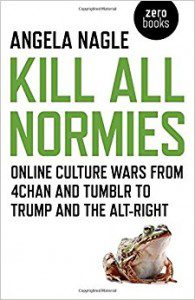 Recent years have seen a revival of the heated culture wars of the 1990s, but this time its battle ground is the internet. On one side the alt right ranges from the once obscure neo-reactionary and white separatist movements, to geeky subcultures like 4chan, to more mainstream manifestations such as the Trump-supporting gay libertarian Milo Yiannopolous. On the other side, a culture of struggle sessions and virtue signalling lurks behind a therapeutic language of trigger warnings and safe spaces. The feminist side of the online culture wars has its equally geeky subcultures right through to its mainstream expression. Kill All Normies explores some of the cultural genealogies and past parallels of these styles and subcultures, drawing from transgressive styles of 60s libertinism and conservative movements, to make the case for a rejection of the perpetual cultural turn.
Recent years have seen a revival of the heated culture wars of the 1990s, but this time its battle ground is the internet. On one side the alt right ranges from the once obscure neo-reactionary and white separatist movements, to geeky subcultures like 4chan, to more mainstream manifestations such as the Trump-supporting gay libertarian Milo Yiannopolous. On the other side, a culture of struggle sessions and virtue signalling lurks behind a therapeutic language of trigger warnings and safe spaces. The feminist side of the online culture wars has its equally geeky subcultures right through to its mainstream expression. Kill All Normies explores some of the cultural genealogies and past parallels of these styles and subcultures, drawing from transgressive styles of 60s libertinism and conservative movements, to make the case for a rejection of the perpetual cultural turn.
Buy this from Amazon UK
6th September 2017
After Europe by Ivan Krastev
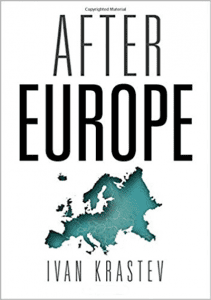 After Macron’s victories in France and the British elite’s spectacular self-destruction, the EU’s position seems much stronger than it was a year ago. But what about the more long term problems plaguing Europe? In this provocative book, renowned public intellectual Ivan Krastev reflects on the political destabilization sparked by the more than 1.3 million migrants, the spread of populism and the thorny issues on the eastern flank of the EU. Will the Union pull through or is it beginning to disintegrate?
After Macron’s victories in France and the British elite’s spectacular self-destruction, the EU’s position seems much stronger than it was a year ago. But what about the more long term problems plaguing Europe? In this provocative book, renowned public intellectual Ivan Krastev reflects on the political destabilization sparked by the more than 1.3 million migrants, the spread of populism and the thorny issues on the eastern flank of the EU. Will the Union pull through or is it beginning to disintegrate?
Read a review here
Buy from Amazon UK
5 July 2017
The New Philistines (Provocations)by Sohrab Ahmari
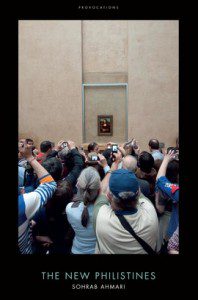 Contemporary art is obsessed with the politics of identity. Visit any contemporary gallery, museum or theatre, and chances are the art on offer will be principally concerned with race, gender, sexuality, power and privilege. Sohrab Ahmari’s book is a passionate cri de coeur against this state of affairs. The New Philistines takes readers deep inside a cultural scene where the quest for truth, freedom and the sacred has been thrust aside to make room for identity politics. Mystery, individuality and beauty are out; radical feminism, racial grievance and queer theory are in. The result seems to be a drearily predictable culture and the narrowing of the space for creative self-expression and honest criticism.
Contemporary art is obsessed with the politics of identity. Visit any contemporary gallery, museum or theatre, and chances are the art on offer will be principally concerned with race, gender, sexuality, power and privilege. Sohrab Ahmari’s book is a passionate cri de coeur against this state of affairs. The New Philistines takes readers deep inside a cultural scene where the quest for truth, freedom and the sacred has been thrust aside to make room for identity politics. Mystery, individuality and beauty are out; radical feminism, racial grievance and queer theory are in. The result seems to be a drearily predictable culture and the narrowing of the space for creative self-expression and honest criticism.
Read a review here
Buy this book from Amazon UK
24 May 2017
The Road to Somewhere: The Populist Revolt and the Future of Politicsby David Goodhart
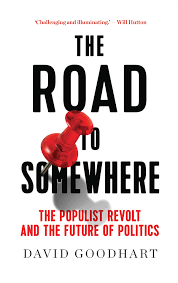 A robust and timely investigation into the political and moral fault-lines that divide Brexit Britain and how a new settlement may be achieved. Several decades of greater economic and cultural openness in the West have not benefited all our citizens. Among those who have been left behind, a populist politics of culture and identity has successfully challenged the traditional politics of Left and Right, creating a new division: between the mobile ‘achieved’ identity of the people from Anywhere, and the marginalised, roots-based identity of the people from Somewhere. This schism accounts for the Brexit vote, the election of Donald Trump, the decline of the centre-left, and the rise of populism across Europe. David Goodhart’s compelling investigation of the new global politics reveals how the Somewhere backlash is a democratic response to the dominance of Anywhere interests, in everything from mass higher education to mass immigration.
A robust and timely investigation into the political and moral fault-lines that divide Brexit Britain and how a new settlement may be achieved. Several decades of greater economic and cultural openness in the West have not benefited all our citizens. Among those who have been left behind, a populist politics of culture and identity has successfully challenged the traditional politics of Left and Right, creating a new division: between the mobile ‘achieved’ identity of the people from Anywhere, and the marginalised, roots-based identity of the people from Somewhere. This schism accounts for the Brexit vote, the election of Donald Trump, the decline of the centre-left, and the rise of populism across Europe. David Goodhart’s compelling investigation of the new global politics reveals how the Somewhere backlash is a democratic response to the dominance of Anywhere interests, in everything from mass higher education to mass immigration.
Read a review here
Buy this book from Amazon UK
5 April 2017
Enough Said: What’s gone wrong with the language of politics by Mark Thompson
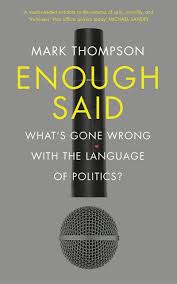 Enough Said tells the story of how we got from the language of FDR and Churchill to that of Donald Trump. It forensically examines the public language we’ve been left with: compressed, immediate, sometimes brilliantly impactful, but robbed of most of its explanatory power. It studies the rhetoric of western leaders from Reagan and Thatcher to Berlesconi, Blair, and today’s political elites on both sides of the Atlantic. And it charts how a changing public language has interacted with real world events – Iraq, the financial crash, the UK’s surprising Brexit from the EU, immigration – and led to a mutual breakdown of trust between politicians and journalists, to leave ordinary citizens suspicious, bitter, and increasingly unwilling to believe anybody.
Enough Said tells the story of how we got from the language of FDR and Churchill to that of Donald Trump. It forensically examines the public language we’ve been left with: compressed, immediate, sometimes brilliantly impactful, but robbed of most of its explanatory power. It studies the rhetoric of western leaders from Reagan and Thatcher to Berlesconi, Blair, and today’s political elites on both sides of the Atlantic. And it charts how a changing public language has interacted with real world events – Iraq, the financial crash, the UK’s surprising Brexit from the EU, immigration – and led to a mutual breakdown of trust between politicians and journalists, to leave ordinary citizens suspicious, bitter, and increasingly unwilling to believe anybody.
Buy this book from Amazon UK
22 February 2017
The Righteous Mind: Why Good People are Divided by Politics and Religion by Jonathan Haidt
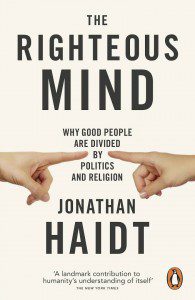 Why can it sometimes feel as though half the population is living in a different moral universe? Why do ideas such as ‘fairness’ and ‘freedom’ mean such different things to different people? Why is it so hard to see things from another viewpoint? Why do we come to blows over politics and religion?
Why can it sometimes feel as though half the population is living in a different moral universe? Why do ideas such as ‘fairness’ and ‘freedom’ mean such different things to different people? Why is it so hard to see things from another viewpoint? Why do we come to blows over politics and religion?
Jonathan Haidt argues that we often find it hard to get along because our minds are hardwired to be moralistic, judgemental and self-righteous. He explores how morality evolved to enable us to form communities, and how moral values are not just about justice and equality – for some people authority, sanctity or loyalty matter more. Haidt poses the question of how it is possible to liberate ourselves from the disputes that divide good people.
Read a review of this book here
Buy this book from Amazon UK
13th December 2016
Pretentiousness by Dan Fox
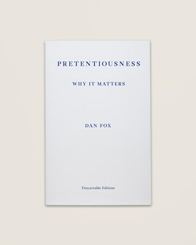 What is pretentiousness? Why do we despise it? And more controversially: why is it vital to a thriving culture? In this brilliant passionate essay, Dan Fox advocates critical imagination and open mindedness over knee-jerk accusations of elitism and argues that it has always been an essential mechanism of the arts, from the most wildly sucessful pop music and fashion through to the most recondite avenues of literature and the visual arts. Pretentiousness: Why it Matters unpacks the uses and abuses of the term, tracing its connections to theatre, politics and class. Drawing on his own experiences growing up and working at the more radical edges of the arts, this book is a timely defence of pretentiousness as a necessity for innovation and diversity in our culture.
What is pretentiousness? Why do we despise it? And more controversially: why is it vital to a thriving culture? In this brilliant passionate essay, Dan Fox advocates critical imagination and open mindedness over knee-jerk accusations of elitism and argues that it has always been an essential mechanism of the arts, from the most wildly sucessful pop music and fashion through to the most recondite avenues of literature and the visual arts. Pretentiousness: Why it Matters unpacks the uses and abuses of the term, tracing its connections to theatre, politics and class. Drawing on his own experiences growing up and working at the more radical edges of the arts, this book is a timely defence of pretentiousness as a necessity for innovation and diversity in our culture.
Buy this book from Amazon UK.
9 November 2016
Blockchain Revolution: How the Technology Behind Bitcoin Is Changing Money, Business and the World by Don Tapscott and Alex Tapscott
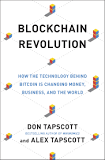 Blockchain is the ingeniously simple technology that powers Bitcoin. But it is much more than that, too. It is a public ledger to which everyone has access, but which no single person controls. It allows for companies and individuals to collaborate with an unprecedented degree of trust and transparency. It is cryptographically secure, but fundamentally open. And soon it will be everywhere.
Blockchain is the ingeniously simple technology that powers Bitcoin. But it is much more than that, too. It is a public ledger to which everyone has access, but which no single person controls. It allows for companies and individuals to collaborate with an unprecedented degree of trust and transparency. It is cryptographically secure, but fundamentally open. And soon it will be everywhere.
Will this game-changing technology shape the future of the world economy and improve everything from healthcare records to online voting, and from insurance claims to artist royalty payments?
Buy this book from Amazon UK
27 September 2016
Against Elections: The Case for Democracy by David Van Reybrouck
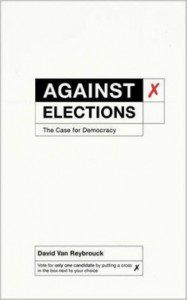 Fear-mongering populists, distrust in the establishment, personality contests instead of reasoned debate: these are the results of the latest elections. In fact, as this ingenious book shows, the original purpose of elections was to exclude the people from power by appointing an elite to govern over them. Yet for most of its 3000-year history, democracy did not involve elections at all: members of the public were appointed to positions in government through a combination of volunteering and lottery. Based on studies and trials from around the globe, this hugely influential manifesto presents the practical case for a true democracy – one that actually works.
Fear-mongering populists, distrust in the establishment, personality contests instead of reasoned debate: these are the results of the latest elections. In fact, as this ingenious book shows, the original purpose of elections was to exclude the people from power by appointing an elite to govern over them. Yet for most of its 3000-year history, democracy did not involve elections at all: members of the public were appointed to positions in government through a combination of volunteering and lottery. Based on studies and trials from around the globe, this hugely influential manifesto presents the practical case for a true democracy – one that actually works.
Buy this book from Amazon UK
9 August 2016
Is the American Century Over? by Joseph S. Nye Jr.
 For more than a century, the United States has been the world′s most powerful state. Now some analysts predict that China will soon take its place. Does this mean that we are living in a post–American world? Will China′s rapid rise spark a new Cold War between the two titans? In this compelling essay, world renowned foreign policy analyst, Joseph Nye, explains why the American century is far from over and what the US must do to retain its lead in an era of increasingly diffuse power politics. America′s superpower status may well be tempered by its own domestic problems and China′s economic boom, he argues, but its military, economic and soft power capabilities will continue to outstrip those of its closest rivals for decades to come.
For more than a century, the United States has been the world′s most powerful state. Now some analysts predict that China will soon take its place. Does this mean that we are living in a post–American world? Will China′s rapid rise spark a new Cold War between the two titans? In this compelling essay, world renowned foreign policy analyst, Joseph Nye, explains why the American century is far from over and what the US must do to retain its lead in an era of increasingly diffuse power politics. America′s superpower status may well be tempered by its own domestic problems and China′s economic boom, he argues, but its military, economic and soft power capabilities will continue to outstrip those of its closest rivals for decades to come.
Buy this book from Amazon UK
10 May 2016
City of Thorns: Nine Lives in the World’s Largest Refugee Camp by Ben Rawlence
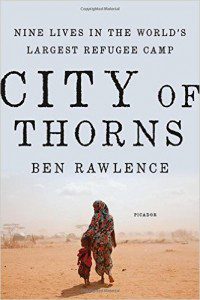
While much of the discussion about refugees has focused on the migration crisis in Europe, less attention has been drawn to the way that refugee status has become a way of life to many people around the world. No longer a temporary expedient of war, the humanitarian camp has become something more permanent in many countries.
Ben Rawlence examines life in one such settlement, Dadaab camp in Kenya, the world’s largest refugee camp, which some people in their 20’s have called home for their entire life. Rawlence chronicles the lives of some of these desperate people, analyses the forces keeping them trapped there and raises some important questions. Refugee camps are often condemned as nurseries for terrorism, but whole generations are being brought up by NGO’s and an externally imposed human rights culture. Does this hold out the promise of incubating liberal values among the worst off or sap their autonomy even further? In a time when states are failing is a huge increase in the global number of refugees something we need to accept and deal with?
Buy this book from Amazon UK
15 March 2016
Inventing the Individual: The Origins of Western Liberalism by Larry Siedentop
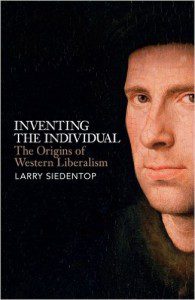 Following on from his highly acclaimed ‘Democracy in Europe’, Siedentop’s ‘Inventing the Individual: The Origins of Western Liberalism’ presents a challenge to many assumptions about how and why individual liberty arose in the West, and offers a radical rethink as to how our moral beliefs were formed. At a time when liberal democracy is on the wane as a model for developing nations and individual freedom is increasingly held in contempt in the West itself, can Siedentop help us understand how the autonomous individual was born and how we can ensure its survival today?
Following on from his highly acclaimed ‘Democracy in Europe’, Siedentop’s ‘Inventing the Individual: The Origins of Western Liberalism’ presents a challenge to many assumptions about how and why individual liberty arose in the West, and offers a radical rethink as to how our moral beliefs were formed. At a time when liberal democracy is on the wane as a model for developing nations and individual freedom is increasingly held in contempt in the West itself, can Siedentop help us understand how the autonomous individual was born and how we can ensure its survival today?
02 February 2016
So You’ve Been Publicly Shamed by Jon Ronson
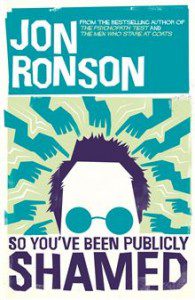 For three years, award-winning writer and documentary maker Jon Ronson travelled the world meeting recipients of high-profile public shamings – people who, say, made a joke on social media that came out badly, or made a mistake at work. This book examines the peculiar twenty-first-century phenomena of the Twitterstorm and ‘calling out’ culture. What lies behind the twittermob and why have unhinged responses to bad jokes and legitimate opinions become so common? Is this a nasty but ultimately harmless trend, or an expression of something more problematic?
For three years, award-winning writer and documentary maker Jon Ronson travelled the world meeting recipients of high-profile public shamings – people who, say, made a joke on social media that came out badly, or made a mistake at work. This book examines the peculiar twenty-first-century phenomena of the Twitterstorm and ‘calling out’ culture. What lies behind the twittermob and why have unhinged responses to bad jokes and legitimate opinions become so common? Is this a nasty but ultimately harmless trend, or an expression of something more problematic?
Buy this book from Amazon UK
24 November 2015
Fragile Empire: How Russia fell in and out of Vladimir Putin by Ben Judah
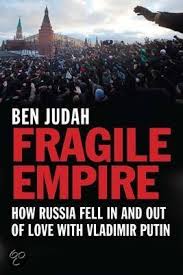 “Is Vladimir Putin’s regime as stable as it seems? Ben Judah argues that far from the popular image of Putin as a strong man, his grip on the country is weak with predatory bureaucrats in place of strong institutions and some parts of Russia ruled over by a lawless mafia.
“Is Vladimir Putin’s regime as stable as it seems? Ben Judah argues that far from the popular image of Putin as a strong man, his grip on the country is weak with predatory bureaucrats in place of strong institutions and some parts of Russia ruled over by a lawless mafia.
So if Putin’s Russia is falling apart, why is it talked up as a threat in the West? And is the image Judah paints of a knackered regime accurate? If Putin can no longer satisfy the aspirations of his people can he not carry on in power regardless? ”
8 September 2015
Freedom Regained: The Possibility of Free Will by Julian Baggini
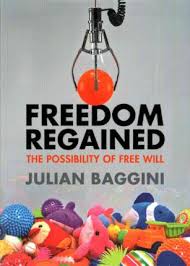 “Are we products of our culture, or free agents within it? How much responsibility should we take for our actions? Contemporary thinking tells us that free will is an illusion, and Baggini challenges this position, providing instead a new, more positive understanding of our sense of personal freedom: a freedom worth having.”
“Are we products of our culture, or free agents within it? How much responsibility should we take for our actions? Contemporary thinking tells us that free will is an illusion, and Baggini challenges this position, providing instead a new, more positive understanding of our sense of personal freedom: a freedom worth having.”
23 June 2015
The City in History by Lewis Mumford
 “The city is the most concrete, the most lasting, and the most inspiring expression of man’s social genius.” According to the dust jacket, no writer has studied urban life more profoundly than Lewis Mumford. This historical study ranges over time from the earliest group habitats to medieval towns to the modern centres of commerce, exploring how the urban form has changed throughout human civilization. Since its publication in 1961 it has helped shape the agendas of urban planners, sociologists, and social critics. More than half a century on what lessons can we learn?
“The city is the most concrete, the most lasting, and the most inspiring expression of man’s social genius.” According to the dust jacket, no writer has studied urban life more profoundly than Lewis Mumford. This historical study ranges over time from the earliest group habitats to medieval towns to the modern centres of commerce, exploring how the urban form has changed throughout human civilization. Since its publication in 1961 it has helped shape the agendas of urban planners, sociologists, and social critics. More than half a century on what lessons can we learn?
Email us for more info, or if you wish to be added to our mailing list.
28 April 2015
The Rise of Islamic State: ISIS and the New Sunni Revolution by Patrick Cockburn
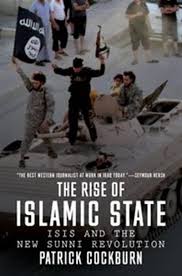 While Al Qaeda is weakened, new jihadi movements, especially ISIS, are starting to emerge. In military operations they have been far more successful than Al Qaeda, taking territory that reaches across borders and includes the city of Mosul. So, how should we view ISIS? Is it really a threat to the UK, or is it just a regional problem? Are we right to tackle ISIS militarily, or does this action risk making things worse, further undermining Western credibility in the region?
While Al Qaeda is weakened, new jihadi movements, especially ISIS, are starting to emerge. In military operations they have been far more successful than Al Qaeda, taking territory that reaches across borders and includes the city of Mosul. So, how should we view ISIS? Is it really a threat to the UK, or is it just a regional problem? Are we right to tackle ISIS militarily, or does this action risk making things worse, further undermining Western credibility in the region?
Read a review of this book, here.
Buy this book from Amazon UK
10 March 2015
What Money Can’t Buy: The Moral Limits of Markets by Michael Sandel
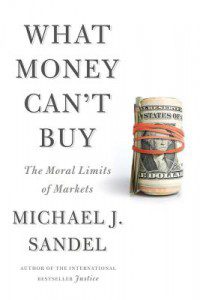
Should we financially reward children for good marks? Is it ethical to pay people to donate organs? What about hiring mercenaries to fight our wars, outsourcing inmates to for-profit prisons or selling citizenship?
‘Superstar philosopher’ Michael Sandel, professor of politics at Harvard, 2009 Reith lecturer, and one of the best known public intellectuals in America, homes in upon concerns that in recent decades, market values have impinged on almost every aspect of life – medicine, education, government, law, even family life.
What Money Can’t Buy is the Top Ten Sunday Times Bestseller that has won praise across the spectrum of commentators from David Aaronovitch to Professor John Gray. So is it true, as Sandel argues, that culture has become mesmerised by the market? That we have drifted from having a market economy to being a market society?
7 January 2015
Suspended Sentences by Patrick Modiano
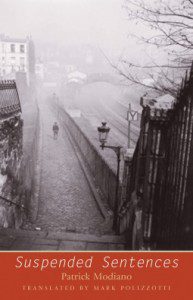 Patrick Modiano won the 2014 Nobel Prize in Literature for “the art of memory with which he has evoked the most ungraspable human destinies and uncovered the life-world of the Occupation”. Hailed in some quarters as a contemporary Marcel Proust, in these three novellas Paris and the Occupation of France take centre-stage as Modiano draws on his own experiences, blended with the real or invented stories of others to create “a dreamlike autobiography that is also the biography of a place”.
Patrick Modiano won the 2014 Nobel Prize in Literature for “the art of memory with which he has evoked the most ungraspable human destinies and uncovered the life-world of the Occupation”. Hailed in some quarters as a contemporary Marcel Proust, in these three novellas Paris and the Occupation of France take centre-stage as Modiano draws on his own experiences, blended with the real or invented stories of others to create “a dreamlike autobiography that is also the biography of a place”.
For some, Modiano’s investigations into the moral history of the occupation make him a “pure original”; for others, he’s “a shifty writer, whose failure to look you in the eye, is profoundly unsettling.” Join us for the discussion and make up your own mind.
02 December 2014
Chinese Whispers: Why Everything You’ve Heard About China is Wrong by Ben Chu
 After the turbulent decades of Mao Zedong’s “New China” and the “reform and opening up” era of his successor, Deng Xiaoping, some say the Chinese state has passed important political and economic inflection points. As a result, argues World Affairs, the third era of the People’s Republic—an era of crisis and instability—has already begun.
After the turbulent decades of Mao Zedong’s “New China” and the “reform and opening up” era of his successor, Deng Xiaoping, some say the Chinese state has passed important political and economic inflection points. As a result, argues World Affairs, the third era of the People’s Republic—an era of crisis and instability—has already begun.
Then again much that is said about China is either questionable or greatly distorted. For example, The Independant’s Ben Chu suggests that while it is commonly thought that the Chinese are the most hardworking people on earth, the younger generation is now derided as spoiled and lazy; and while it has been said that Chinese people don’t care about political freedom, the country’s internet is actually exploding with anti-regime dissent. Chu examines these and other myths that have come to dominate our view of the world’s most populous nation. So is his an insightful corrective? Or has he merely got his own myths to peddle?
Discussion will be introduced by Cara Bleiman (白海容)
19 August 2014
Going Solo by Eric Klinenberg
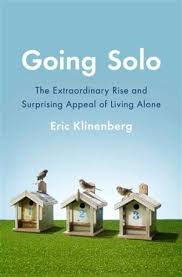
In 1950, only 22% of adults were single. Today, more than 50% of adults are. Though conventional wisdom tells us that living by oneself leads to loneliness and isolation, most solo dwellers, compared with their married counterparts, are more likely to eat out and exercise, sign up for art and music classes, attend public events and lectures, and volunteer. Drawing on over three hundred in-depth interviews with men and women of all ages and every class, Eric Klinenberg reaches some startling conclusions about the seismic impact solo living is having on our culture, business and politics.
1 July 2014
Parenting Culture Studies by Elli Lee, Jennie Bristow, Charlotte Faircloth and Jan Macvarish
Why are there now so-called ‘parenting experts’, and social movements like Attachment Parenting, telling us that ‘science says’ what parents do is the cause of and solution to social problems? Parenting Culture Studies provides in-depth answers to these features of contemporary social life drawing on a wide range of sources from sociology, history, anthropology, psychology and policy studies to do so, covering developments in both Europe and North America.
Five essays detail contemporary examples of obsessions with parenting, discussing drinking and pregnancy, attachment theory, neuroscience and family policy, fathering, and ‘helicopter parenting’. The Introduction situates parental determinism in the wider context of risk consciousness and the demise of social confidence about how to approach the future. Comprehensive in scope and accessibly written, this book will be an indispensable resource for students, researchers, policy-makers and parents seeking a deeper understanding of the debates surrounding parenting and society today.
29 April 2014
Writing on the Wall: Social Media-The First 2,000 years by Tom Standage
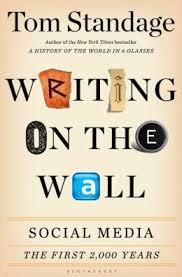 It is often said that the rise of social media heralds an unprecedented age of freedom, but have we been here before and if so, what lessons can we draw from past eras. Writing on the Wall argues that ‘new’ media is in fact a continuation of an old tradition. From the Classical World to the Enlightenment, these eras saw a flourishing of writing, ideas, conversations and social networks. The development of the technology of mass media, the book argues, put an end to this freedom.
It is often said that the rise of social media heralds an unprecedented age of freedom, but have we been here before and if so, what lessons can we draw from past eras. Writing on the Wall argues that ‘new’ media is in fact a continuation of an old tradition. From the Classical World to the Enlightenment, these eras saw a flourishing of writing, ideas, conversations and social networks. The development of the technology of mass media, the book argues, put an end to this freedom.
But does the history show this picture to be more complicated? The printing press sparked revolutions in its day, but this also depended on the existence of a critical public. In the absence of such a public today, it may be argued that social media only fosters isolation, group-think, or intrusive state regulation. A history of older forms of ‘new’ media might be useful in thinking about how such a public might be formed and whether the free flow of ideas is sufficient to create it.
READ A REVIEW here
10 March 2014
Rites of Spring: The Great War and the Birth of the Modern Age by Modris Eksteins
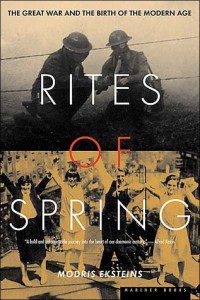 Rites of Spring probes the origins, the impact and the aftermath of World War One from the première of Stravinksy’s Ballet The Rite of Spring to the death of Hitler in 1945. As fundamental conflicts surfaced in virtually all areas of human endeavour and behaviour including in the arts, fashion, sexual mores, between generations, and in politics, Eksteins argues that the Great War was the psychological turning point for modernism.
Rites of Spring probes the origins, the impact and the aftermath of World War One from the première of Stravinksy’s Ballet The Rite of Spring to the death of Hitler in 1945. As fundamental conflicts surfaced in virtually all areas of human endeavour and behaviour including in the arts, fashion, sexual mores, between generations, and in politics, Eksteins argues that the Great War was the psychological turning point for modernism.
28 January 2014
Consuming Higher Education by Joanna Williams

While increases in student fees have been much criticised many now accept that a student’s choice of subjects should be based on their potential to increase future earnings, or that student feedback surveys should shape education. So does the consumption model empower students or erode their autonomy and what is its wider impact on universities, learning and knowledge?
Email us if you wish to be added to the Readers’ Group mailing list.
10 December 2013
On London by Charles Dickens
 While many recent texts have rendered the city flat and one-dimensional, this selection of Dickens’ little-known excerpts, essays and letters collectively serve to showcase Victorian London in all its seedy, opulent, oppressive, liberating, tumultuous glory. Expert Alex Werner notes that while London was Dickens’ muse, a love/hate relationship led him to explore its dark as well as its colourful side.
While many recent texts have rendered the city flat and one-dimensional, this selection of Dickens’ little-known excerpts, essays and letters collectively serve to showcase Victorian London in all its seedy, opulent, oppressive, liberating, tumultuous glory. Expert Alex Werner notes that while London was Dickens’ muse, a love/hate relationship led him to explore its dark as well as its colourful side.
So why read Dickens today? Numerous studies now argue that reading fiction is good because it makes you a more effective social agent. Indeed Dickens more than most is cited as an example of the ethical and political potential of fiction, of its use as a springboard for debates about moral and social reform. But can fiction have such a practical usefulness and is it helpful to attempt to value literary works in such terms?
13 November 2013
Cities Are Good For You: The Genius of the Metropolis by Leo Hollis
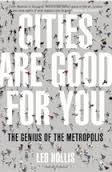 “For centuries we have been taught that the city was bad for us, that it was drain of our humanity, that it destroyed the old ways and traditions, split families and offered little in exchange but disorder, dirt and noise.” So writes Leo Hollis in the introduction to Cities AreGood For You, one of a number of recent books presenting a positive spin on the city and urban life. So why is it now fashionable to laud the city? And do cities, as it is claimed, make us fitter, smarter, greener, more creative and even happier?
“For centuries we have been taught that the city was bad for us, that it was drain of our humanity, that it destroyed the old ways and traditions, split families and offered little in exchange but disorder, dirt and noise.” So writes Leo Hollis in the introduction to Cities AreGood For You, one of a number of recent books presenting a positive spin on the city and urban life. So why is it now fashionable to laud the city? And do cities, as it is claimed, make us fitter, smarter, greener, more creative and even happier?
Buy this book from Amazon UK
10 September 2013
Population 10 Billion: The Coming Demographic Crisis and How to Survive it by Danny Dorling
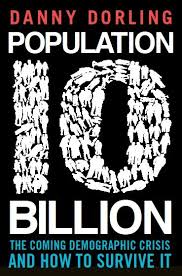 “Population predictions are not as grim as they are perceived to be.” At a time when Malthusian attitudes to population growth have reappeared, Danny Dorling seems to buck the trend when he argues against the idea that 10 billion people in the world will create what has been called “an unprecedented planetary emergency”. So is Dorling right to suggest that the challenge today is not the population ‘problem’ as such, but how resources are distributed? Should we accept that the price to pay for more people on the planet will be that the richest billion must make do with less?
“Population predictions are not as grim as they are perceived to be.” At a time when Malthusian attitudes to population growth have reappeared, Danny Dorling seems to buck the trend when he argues against the idea that 10 billion people in the world will create what has been called “an unprecedented planetary emergency”. So is Dorling right to suggest that the challenge today is not the population ‘problem’ as such, but how resources are distributed? Should we accept that the price to pay for more people on the planet will be that the richest billion must make do with less?
Buy this book from Amazon UK
9 July 2013
Behind the Beautiful Forevers: Life, Death and Hope in a Mumbai Slum by Katherine Boo
 Annawadi is a slum at the edge of Mumbai Airport, in the shadow of shining new luxury hotels. Its residents are garbage recyclers, construction workers and economic migrants, all of them living in the hope that a small part of India’s booming future will eventually be theirs. But when a crime rocks the slum community and global recession and terrorism shocks the city, tensions over religion, caste, sex, power, and economic envy begin to turn brutal. As Boo gets to know those who dwell at Mumbai’s margins, she evokes an extraordinarily vivid and vigorous group of individuals flourishing against the odds amid the complications, corruptions and inequalities of the new India.
Annawadi is a slum at the edge of Mumbai Airport, in the shadow of shining new luxury hotels. Its residents are garbage recyclers, construction workers and economic migrants, all of them living in the hope that a small part of India’s booming future will eventually be theirs. But when a crime rocks the slum community and global recession and terrorism shocks the city, tensions over religion, caste, sex, power, and economic envy begin to turn brutal. As Boo gets to know those who dwell at Mumbai’s margins, she evokes an extraordinarily vivid and vigorous group of individuals flourishing against the odds amid the complications, corruptions and inequalities of the new India.
Buy this book from Amazon UK
4 June 2013
The Reward Society by Tom Monion
 Tom Monion says that we now accept as normal the ‘dishonesty, idleness and lack of thought for others that in the past wouldn’t have been tolerated. He suggests a combination of casino capitalism and welfare dependency has undermined personal responsibility, either by encouraging a sense of entitlement or by rewarding people for staying poor and seeing themselves as victims.
Tom Monion says that we now accept as normal the ‘dishonesty, idleness and lack of thought for others that in the past wouldn’t have been tolerated. He suggests a combination of casino capitalism and welfare dependency has undermined personal responsibility, either by encouraging a sense of entitlement or by rewarding people for staying poor and seeing themselves as victims.
This book seems skeptical of the plethora of interventions by the state into the lives of ordinary people such as social workers intervening in the lives or ‘anti-social’ families which he argues actually will increase dependency. Instead, he wants to create a culture of thrift, hard work, good diets, neighbourliness and civic pride. But are these solutions really innovative? Can the state encourage people to be responsible without infantalising them?
16 April 2013
There is No Such Thing As a Free Press… and we need one more than ever by Mick Hume
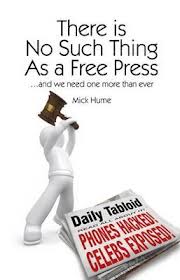 Whatever the latest twists in the negotiations over press regulation in the aftermath of Leverson, all sides appear to agree that the press is too free to run wild and must be tamed one way or another. Whether statutory regulation or a royal charter, the fine print of how the press is to be regulated seems to come before standing up for the bigger principles of press freedom.
Whatever the latest twists in the negotiations over press regulation in the aftermath of Leverson, all sides appear to agree that the press is too free to run wild and must be tamed one way or another. Whether statutory regulation or a royal charter, the fine print of how the press is to be regulated seems to come before standing up for the bigger principles of press freedom.
This month’s Readers’ Group book is There is No Such Thing As a Free Press….and we need one more than ever by Mick Hume who argues that there are problems with the way we view the press today. He both challenges the distorted perceptions about the role of the media and makes a bold argument for true freedom of the press.
Buy this book from Amazon UK
12 March 2013
Hungry City: How Food Shapes Our Lives by Carolyn Steel
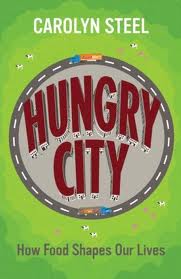 ‘Food shapes cities, and through them, it moulds us’. For Steel, feeding cities arguably has a greater social and physical impact on us and our planet than anything else we do. She sets out to use food in order to trace the critical path of urban civilisation, viewing it as a means to rethink the future of cities.
‘Food shapes cities, and through them, it moulds us’. For Steel, feeding cities arguably has a greater social and physical impact on us and our planet than anything else we do. She sets out to use food in order to trace the critical path of urban civilisation, viewing it as a means to rethink the future of cities.
Buy this book from Amazon UK
29 January 2013
The New Industrial Revolution: Consumers, Globalization and the End of Mass Production by Peter Marsh
 Many believe that in the West the game is up for the old industrial and manufacturing economies and that economic power is inexorably shifting east. However, a new brand of optimist – epitomised by Peter Marsh, the Manufacturing Editor of the Financial Times – believe that the west still has an important economic role in which manufacturing is key. With a broad historical sweep, here Marsh makes the case for and lays out the features of what he believes to be a fifth industrial revolution.
Many believe that in the West the game is up for the old industrial and manufacturing economies and that economic power is inexorably shifting east. However, a new brand of optimist – epitomised by Peter Marsh, the Manufacturing Editor of the Financial Times – believe that the west still has an important economic role in which manufacturing is key. With a broad historical sweep, here Marsh makes the case for and lays out the features of what he believes to be a fifth industrial revolution.
12 December 2012
Invisible Cities by Italo Calvino
 Upon hearing of Italo Calvino’s death in September of 1985, John Updike commented, “Calvino took fiction into new places where it had never been before, and back into the fabulous and ancient sources of narrative.” Invisible Cities has been described as ‘classically modernist’ and ‘giddily postmodern’, and according to Gore Vidal it is “perhaps the most beautiful work.” So is it over-hyped or a contemporary classic? Come and discuss over a Xmas glass of wine.
Upon hearing of Italo Calvino’s death in September of 1985, John Updike commented, “Calvino took fiction into new places where it had never been before, and back into the fabulous and ancient sources of narrative.” Invisible Cities has been described as ‘classically modernist’ and ‘giddily postmodern’, and according to Gore Vidal it is “perhaps the most beautiful work.” So is it over-hyped or a contemporary classic? Come and discuss over a Xmas glass of wine.
Buy this book from Amazon UK
7 November 2012
The Great Stagnation: How America Ate All the Low-Hanging Fruit of Modern History, Got Sick, and Will (Eventually) Feel Better by Tyler Cowen
 “America is in disarray and our economy is failing us.” In the year of a lacklustre American election, a generalised sense exists that the future ain’t what it used to be. The Great Stagnation suggests an alternative to blaming the banks and instead explores whether the era of rapid economic growth, particularly of improvements associated with technological progress, may have been at an end for some time – and if this means that a prolonged period of economic stagnation could lie ahead. Is the argument true? If so, what might it imply? And what might be the means to overcome it?
“America is in disarray and our economy is failing us.” In the year of a lacklustre American election, a generalised sense exists that the future ain’t what it used to be. The Great Stagnation suggests an alternative to blaming the banks and instead explores whether the era of rapid economic growth, particularly of improvements associated with technological progress, may have been at an end for some time – and if this means that a prolonged period of economic stagnation could lie ahead. Is the argument true? If so, what might it imply? And what might be the means to overcome it?
Buy this book from Amazon UK
4 September 2012
Ground Control: Fear and happiness in the twenty-first Century by Anna Minton
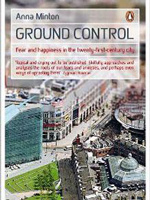 From Canary Wharf to the Olympic park, the last 30 years have seen considerable regeneration in our cities. But at what cost? For Anna Minton, the desire to renew our cities has inadvertently led to a divided country that segregates rich and poor, ensures that all new build benefits corporations at the expense of public good, and facilitates a sanitised and sterile society. Does this tell the whole story? Why is it that innovation in urban planning seems to be driven by the needs of finance and consumerism and does it matter as long as the architecture is good? Is equality more important in how we plan our cities or should we set our sights on a more inventive as well as a more free vision of city life?
From Canary Wharf to the Olympic park, the last 30 years have seen considerable regeneration in our cities. But at what cost? For Anna Minton, the desire to renew our cities has inadvertently led to a divided country that segregates rich and poor, ensures that all new build benefits corporations at the expense of public good, and facilitates a sanitised and sterile society. Does this tell the whole story? Why is it that innovation in urban planning seems to be driven by the needs of finance and consumerism and does it matter as long as the architecture is good? Is equality more important in how we plan our cities or should we set our sights on a more inventive as well as a more free vision of city life?
12 July 2012
Film screening of ‘Utopia London’
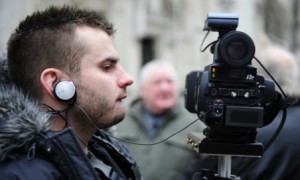 Utopia London directed by Tom Cordell, described as a “visually stunning documentary about the 20th century rebuilding of London by modernist architects” These modernist architects were united around a vision -using science and art to create a society of equal citizens. The film shows how they revolutionised life in the city in the wake of destruction from WWII and eliminated the poor living conditions inherited from the Industrial Revolution.
Utopia London directed by Tom Cordell, described as a “visually stunning documentary about the 20th century rebuilding of London by modernist architects” These modernist architects were united around a vision -using science and art to create a society of equal citizens. The film shows how they revolutionised life in the city in the wake of destruction from WWII and eliminated the poor living conditions inherited from the Industrial Revolution.
12 June 2012
Emerging Africa: how 17 countries are leading the way by Steven C. Radelet
The prevailing view of Africa in the West is that Africa is a basketcase, a hopeless continent. Radelet argues that this view is increasingly out of date. Across the continent many countries have defied expectations and have launched a remarkable, if little noticed, turnaround.
May 2012
Together: the rituals, politics and pleasures of co-operation by Richard Sennett
 Together traces the evolution of cooperative rituals in medieval churches and guilds, Renaissance workshops and courts, early modern laboratories and diplomatic embassies. In our lives today, it explains the trials and prospects of cooperation online, face-to-face in ethnic conflicts, among financial workers and community organizers. Exploring the nature of cooperation, why it has become weak, and how it could be strengthened, this visionary book offers a new way of seeing how humans can live together.
Together traces the evolution of cooperative rituals in medieval churches and guilds, Renaissance workshops and courts, early modern laboratories and diplomatic embassies. In our lives today, it explains the trials and prospects of cooperation online, face-to-face in ethnic conflicts, among financial workers and community organizers. Exploring the nature of cooperation, why it has become weak, and how it could be strengthened, this visionary book offers a new way of seeing how humans can live together.
Introduced by Dave Clements. Read his review here
March 2012
The First London Olympics: 1908 by Rebecca Jenkins
 “In the light of the forthcoming Olympics of 2012, it seems appropriate to revisit the first London Games. This is a tale of the extraordinary endeavours of ordinary men – sugar bakers and policemen and market gardeners. And more – there is a White City of palaces built by an Hungarian showman and a heroically dutiful sporting aristocrat and the greatest stadium in the world (at the time).”
“In the light of the forthcoming Olympics of 2012, it seems appropriate to revisit the first London Games. This is a tale of the extraordinary endeavours of ordinary men – sugar bakers and policemen and market gardeners. And more – there is a White City of palaces built by an Hungarian showman and a heroically dutiful sporting aristocrat and the greatest stadium in the world (at the time).”
Read Alison Walker’s introduction to the discussion here
February 2012
The Lure of the City: from slums to suburbs edited by Austin Williams and Alastair Donald
 Cities, by their very nature, are a mass of contradictions. They can be at once visually stunning, culturally rich, exploitative and unforgiving. This book explores the potential of cities to meet the economic, social and political challenges of the current age. The short, accessibly written essays are guaranteed to spark debate across the media and academia about the place of cities and urban life in our ever-changing world.
Cities, by their very nature, are a mass of contradictions. They can be at once visually stunning, culturally rich, exploitative and unforgiving. This book explores the potential of cities to meet the economic, social and political challenges of the current age. The short, accessibly written essays are guaranteed to spark debate across the media and academia about the place of cities and urban life in our ever-changing world.
January 2012
The End of the West: the once and future Europe by David Marquand
 Has Europe’s extraordinary postwar recovery limped to an end? It would seem so. David Marquand argues that Europe’s problems stem from outdated perceptions of global power, and calls for a drastic change in European governance to halt the continent’s slide into irrelevance.
Has Europe’s extraordinary postwar recovery limped to an end? It would seem so. David Marquand argues that Europe’s problems stem from outdated perceptions of global power, and calls for a drastic change in European governance to halt the continent’s slide into irrelevance.
Read David Bowden’s introduction to the discussion here
November 2011
Aping Mankind: Neuromania, Darwinitis and the Misrepresentation of Humanity by Raymond Tallis
 Tallis exposes the exaggerated claims made for the ability of neuroscience and evolutionary theory to explain human consciousness, behaviour, culture and society and promises to show that human beings are infinitely more interesting and complex than they appear in the mirror of ‘biologism’. By minimising the differences between humans and their nearest animal kin, we may find reasons for treating each other like them.
Tallis exposes the exaggerated claims made for the ability of neuroscience and evolutionary theory to explain human consciousness, behaviour, culture and society and promises to show that human beings are infinitely more interesting and complex than they appear in the mirror of ‘biologism’. By minimising the differences between humans and their nearest animal kin, we may find reasons for treating each other like them.
October 2011
Made in Britain: How the Nation Earns its Living by Evan Davis
 Looking at how Britain pays its way in the world today. This book is about the things that Britain produces from physical goods that we can see and feel, to intangible services that are much harder to quantify. We shouldn’t assume finance is modern, and manufacturing. What matters is what sells and for how much.
Looking at how Britain pays its way in the world today. This book is about the things that Britain produces from physical goods that we can see and feel, to intangible services that are much harder to quantify. We shouldn’t assume finance is modern, and manufacturing. What matters is what sells and for how much.
June 2011
The Honor Code: How Moral Revolutions Happen by Kwame Anthony Appiah
 Over the last few centuries, new democratic movements have led to the emancipation of women, slaves and the oppressed. What drove these modern changes, Appiah argues, was not imposing legislation from above but harnessing the ancient power of honour from within.
Over the last few centuries, new democratic movements have led to the emancipation of women, slaves and the oppressed. What drove these modern changes, Appiah argues, was not imposing legislation from above but harnessing the ancient power of honour from within.
May 2011
The Hemlock Cup: Socrates, Athens and the Search for the Good Life by Bettany Hughes
 Socrates’ aphorism ‘The unexamined life is not worth living’ may have originated 25 centuries ago, but it’s a founding principle of modern life.
Socrates’ aphorism ‘The unexamined life is not worth living’ may have originated 25 centuries ago, but it’s a founding principle of modern life.
January 2011
The Genius in All of Us: why everything you’ve been told about genes, talent and intelligence is wrong by David Shenk
 David Shenk argues that talent- for piano playing, sprinting, designing computers, you name it – is not a thing we’re gifted from birth and coded in our genes, but a process – a lifelong project. Integrating cutting-edge research from cognitive science, genetics, biology, child development – Shenk portrays a highly optimistic new view of human potential.
David Shenk argues that talent- for piano playing, sprinting, designing computers, you name it – is not a thing we’re gifted from birth and coded in our genes, but a process – a lifelong project. Integrating cutting-edge research from cognitive science, genetics, biology, child development – Shenk portrays a highly optimistic new view of human potential.
November 2010
The Beijing Consensus: How China’s Authoritarian Model Will Dominate the 21st Century by Stefan Halper
 Foreign Affairs magazine writes: “Disagreeing with those who think that a search for respectability will lead China to scale back its relations with rogue states, Halper argues that Beijing is locked into such relationships due to its dependence on natural resources. Likewise, he doubts that China will democratize as it grows richer, because it is wealth that underwrites the regime’s legitimacy. In Halper’s telling, the real threat facing the West is the West’s own failure to practice and promote its values.”
Foreign Affairs magazine writes: “Disagreeing with those who think that a search for respectability will lead China to scale back its relations with rogue states, Halper argues that Beijing is locked into such relationships due to its dependence on natural resources. Likewise, he doubts that China will democratize as it grows richer, because it is wealth that underwrites the regime’s legitimacy. In Halper’s telling, the real threat facing the West is the West’s own failure to practice and promote its values.”
September 2010
Beauty by Roger Scruton
 “Everything I have said about the experience of beauty implies that it is rationally founded.”
“Everything I have said about the experience of beauty implies that it is rationally founded.”
Is beauty in the eye of the beholder, or is there some eternal essence that transcends personal experience? This is a fascinating book about beauty, that doesn’t attempt to define it.
August 2010
Taming the Gods: Religion and Democracy on Three Continents by Ian Baruma
 Baruma asks whether religious ideas and practices undermine the very notion of the independent functions of a secular society; but he also wonders whether a secular framework of the rule of law is enough without the role of ethics, ideals, values and beliefs.
Baruma asks whether religious ideas and practices undermine the very notion of the independent functions of a secular society; but he also wonders whether a secular framework of the rule of law is enough without the role of ethics, ideals, values and beliefs.
Introduced by Steve Nash. Read his review here
June 2010
Whole Earth Discipline: An ecopragmatist manifesto by Stewart Brand
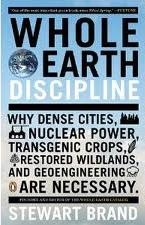 With a combination of scientific analysis, Brand attempts to show where the sources of our dilemmas lie and offers a bold and “creative” set of policies and solutions for producing a more sustainable society.’
With a combination of scientific analysis, Brand attempts to show where the sources of our dilemmas lie and offers a bold and “creative” set of policies and solutions for producing a more sustainable society.’
Introduced by Rob Lyons, Deputy Editor of Spiked Online. Read his review here
April 2010
Dream: Re-imagining Progressive Politics in an Age of Fantasy by Stephen Duncombe
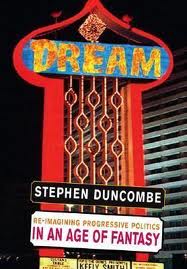 With probably the most uninspiring general election in living memory almost upon us, is the solution to the lack of ideas in politics to dream, to connect more with the aspirations of people? Duncombe grappled with a similar problem in the wake of the Bush assendancy. But was Obama a successful attempt to utilise what he calls ‘Dreampolitik’ and why did it go sour? Could it work over here?
With probably the most uninspiring general election in living memory almost upon us, is the solution to the lack of ideas in politics to dream, to connect more with the aspirations of people? Duncombe grappled with a similar problem in the wake of the Bush assendancy. But was Obama a successful attempt to utilise what he calls ‘Dreampolitik’ and why did it go sour? Could it work over here?
March 2010
Smile or Die: How Positive Thinking Fooled America and the World by Barbara Ehrenreich
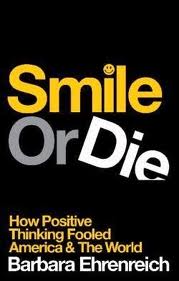 “Barbara Ehrenreich confronts the cult of positive thinking in America – from the women with breast cancer who find themselves surrounded by pink ribbons and platitudes, to the refusal to consider negative outcomes in business which contributed directly to the recent economic disaster.”
“Barbara Ehrenreich confronts the cult of positive thinking in America – from the women with breast cancer who find themselves surrounded by pink ribbons and platitudes, to the refusal to consider negative outcomes in business which contributed directly to the recent economic disaster.”
February 2010
The Bully State: The End of Tolerance by Brian Monteith
 “We won’t lose the freedoms that we cherish by a military coup or some great cataclysmic war engulfing us, but through the gradual invasion of our private lives by the very politicians we elect to protect us – and all in the cause of looking after our health.”
“We won’t lose the freedoms that we cherish by a military coup or some great cataclysmic war engulfing us, but through the gradual invasion of our private lives by the very politicians we elect to protect us – and all in the cause of looking after our health.”











